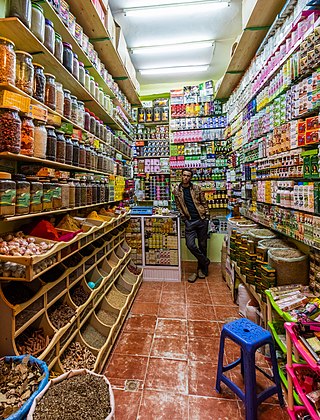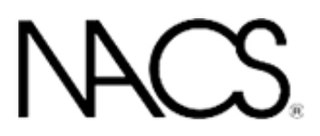
Retail is the sale of goods and services to consumers, in contrast to wholesaling, which is sale to business or institutional customers. A retailer purchases goods in large quantities from manufacturers, directly or through a wholesaler, and then sells in smaller quantities to consumers for a profit. Retailers are the final link in the supply chain from producers to consumers.

Black Friday is the Friday after Thanksgiving in the United States. It traditionally marks the start of the Christmas shopping season in the United States. Many stores offer highly promoted sales at discounted prices and often open early, sometimes as early as midnight or even on Thanksgiving. Some stores' sales continue to Monday or for a week.

Toys "R" Us is an American toy, clothing, and baby product retailer owned by Tru Kids and various others. The company was founded in 1948; its first store was built in April 1948, with its headquarters located in Parsippany-Troy Hills, New Jersey, in the New York metropolitan area.

Pier 1 Imports, Inc., is an online retailer and former Fort Worth, Texas-based retail chain specializing in imported home furnishings and decor, particularly furniture, table-top items, decorative accessories, and seasonal decor. It was publicly traded on the New York Stock Exchange under ticker PIR. In January 2020, Pier 1 had over 1,000 physical stores throughout the United States and Canada. Pier 1 filed for Chapter 11 bankruptcy protection on February 17, 2020, and on May 19, 2020, announced it was asking the bankruptcy court to close all stores, due in large part to the COVID-19 pandemic.

Retail loss prevention is a set of practices employed by retail companies to preserve profit. Loss prevention is mainly found within the retail sector but also can be found within other business environments.
Lane Crawford (HK) Limited is a retail company founded in 1850 operating specialist department stores selling luxury goods in Hong Kong and Mainland China. It is headquartered in One Island South, Wong Chuk Hang.

Self-checkouts (SCOs), also known as assisted checkouts (ACOs) or self-service checkouts, are machines that provide a mechanism for customers to complete their own transaction from a retailer without needing a traditional staffed checkout. When using SCOs, customers scan item barcodes before paying for their total shop without needing one-to-one staff assistance. Self-checkouts are used mainly in supermarkets, although they are not uncommon in department or convenience stores. Most self-checkout areas are supervised by at least one staff member, often assisting customers process transactions, correcting prices, or otherwise providing service.

JB Hi-Fi Limited is an Australian consumer electronics and home appliances retail company. It is publicly listed on the Australian Securities Exchange. Its headquarters are located in Southbank, Melbourne, Victoria.
Roundy's Supermarkets is an American supermarket operator. It owns and operates stores under the names of Pick 'n Save, Metro Market, and Mariano's Fresh Market. The chain is a subsidiary of Kroger. Roundy's operates 149 supermarkets and 107 pharmacies throughout the states of Wisconsin and Illinois. Based on fiscal year 2012 sales, Roundy's was the 37th largest grocery store chain and the 89th largest retailer in the United States. As of December 2015, Roundy's became a subsidiary of Kroger of Cincinnati, Ohio.
Jo-Ann Stores, LLC, more commonly known as Jo-Ann, is an American haberdashery and mercery based in Hudson, Ohio. It operates the retail chains JOANN Fabrics and Crafts and Jo-Ann Etc. The headquarters of the company is located in the former General Motors Terex plant.

The National Association of Convenience Stores (NACS) is a trade association representing the convenience and fuel retailing industry. Founded in 1961, NACS has thousands of member companies, primarily in the United States but also in about 50 other countries. NACS conducts market research, hosts conferences and trade shows, and conducts political and legal advocacy. NACS is particularly concerned with the regulation of motor fuels, high credit card swipe fees, and labor law.
Organized retail crime (ORC) refers to professional criminal enterprises ranging from regional gangs to international crime rings and other organized crime focussing on retail environments. Operations include truckjacking, shoplifting, smash and grab, cargo theft, and cargo diversion. One person acting alone is not considered an example of organized retail crime. Working in teams, some create distractions while others steal items judiciously, indiscriminately or violently. Often, they are stocking up on specified items at the request of the organized crime or gang leader. It is not uncommon for the criminals to have accomplices working in the retail store or corporation.
Linens 'n Things was a big-box retailer specializing in home textiles, housewares, and decorative home accessories. Based in Clifton, New Jersey, the chain operated 571 stores in 47 U.S. states and six Canadian provinces, and had 7,300 employees as of December 2006. The company's business strategy was "to offer a broad selection of high quality, brand name home furnishings merchandise at exceptional everyday values, provide superior guest service, and maintain low operating costs."

B&M European Value Retail S.A., trading as B&M, is a British multinational variety store chain founded in 1978 and incorporated in Luxembourg. It is listed on the London Stock Exchange, and is a constituent of the FTSE 100 Index.
Return fraud is the act of defrauding a retail store by means of the return process. There are various ways in which this crime is committed. For example, the offender may return stolen merchandise to secure cash, steal receipts or receipt tape to enable a falsified return, or use somebody else's receipt to try to return an item picked up from a store shelf.

In retail, a product return is the process of a customer taking previously purchased merchandise back to the retailer, and in turn receiving a refund in the original form of payment, exchange.

Retail's Big Show, or the NRF Annual Convention & EXPO, is the flagship industry event of the National Retail Federation (NRF).

Retail apocalypse refers to the closing of numerous brick-and-mortar retail stores, especially those of large chains, beginning around 2010 and accelerating due to the mandatory closures during the COVID-19 pandemic.

The COVID-19 pandemic affects the global fashion industry as governments close down manufacturing plants, and through store closures, and event cancellations to attempt to slow the spread of the virus. The COVID-19 pandemic has had a major impact on fashion brands worldwide. At the same time, the fashion industry faces challenges in consumer demand. New opportunities are also presenting themselves as fashion brands shift to making fashionable COVID-19 face masks. Domenico de Sole, chairman of Tom Ford International, remarked that "I have seen a lot of difficult situations in my long career and this has been the most devastating event, not just for fashion and luxury, but all industries."

The COVID-19 pandemic has taken a sharp economic toll on the retail industry worldwide as many retailers and shopping centers were forced to shut down for months due to mandated stay-at-home orders. As a result of these closures, online retailers received a major boost in sales as customers looked for alternative ways to shop and the effects of the retail apocalypse were exacerbated. A number of notable retailers filed for bankruptcy including Ascena Retail Group, Debenhams, Arcadia Group, Brooks Brothers, GNC, J. C. Penney, Lord & Taylor and Neiman Marcus.













